South London District Erupts Again
- Share via
Europe
London: Shops were looted, cars set ablaze and at least 10 people were injured during a five-hour riot in the Brixton area of south London earlier this month. Following a demonstration over the death of a black man in police custody, hundreds of young blacks and whites, many armed with bats, fought with police, and some gunfire was heard, according to Reuters news service. Brixton, devastated by race riots in 1981, is one of the high-crime areas of metropolitan London red-flagged by the State Department under the heading “Should be avoided if possible.” The others are Notting Hill, Lewisham and Peckham. Elsewhere in Britain, the cities of Birmingham, Manchester, Liverpool, Bristol, Cardiff and Glasgow also contain areas with high crime rates.
Asia
Malaysia: An American woman faces a possible death sentence after being charged with drug trafficking. According to Reuters, police say Brenda Denise Ferguson of Milwaukee was arrested in September at Kuala Lumpur International Airport with more than five pounds of heroin. Malaysia has hanged more than 100 people, including scores of foreigners, for drug offenses. The State Department notes that about 2,700 Americans are arrested abroad each year, about one-third of them on drug charges, and the department lists these harsh facts: Few countries provide a jury trial, and most do not accept bail. “Physical abuse, confiscation of personal property, degrading or inhumane treatment and extortion are possible,” according to the State Department. And depending on the country, sentences can range from two years to the death penalty.
Central America
Guatemala: The country’s reputation for violence was underscored by several recent incidents. The body of a 50-year-old United Nations development worker was found in a shallow rural grave after the woman had been kidnapped by unidentified gunmen. The motive for the murder was not known. Another kidnapped woman, the niece of a former Guatemelan defense minister, also was found murdered. A kidnapped American was freed by his captors; two weeks later, police foiled the attempted kidnapping of an American woman attached to the U.N. mission in Guatemala. One weekend early this month was described as the most violent this year, with 37 bodies, most showing signs of violence, brought to the Guatemala City morgue.
Africa
South Africa: A British-born South African was shot to death in front of his 10-year-old daughter by three men during an attempted carjacking in Johannesburg. The government also expressed concern about the possible damage to tourism inflicted by the abduction of three Britons and a New Zealander, and the rape of two of them, in South Africa’s Transkei region in September. (Freed by their abductors, the four have returned home.) While terming the attack an isolated incident in an out-of-the-way area, Tourism Minister Dawie de Villiers said tourism businesses should consider warning foreign visitors about dangerous areas of the country. According to Reuters, South Africa has an average of 44 murders per 100,000 people every day, the world’s highest rate for a country not at war.
Briefly . . .
Tahiti: As France continues its controversial nuclear tests in the South Pacific, Reuters reports that thousands of hotel room bookings have been canceled since anti-nuclear protesters rioted on the island in September and that cancellations for all of French Polynesia might total 6,000. Some of the smaller hotels may close for good.
Cyprus: In what police call a growing gangland war over control of nightclubs, a club owner was shot to death in the port of Limassol. Within two weeks of the killing, three more bombs exploded in the city, and a bomb in Larnaca killed a resident of a building housing cabaret entertainers.
India: The U.S. Embassy in New Delhi reports serious outbreaks of malaria in Calcutta, West Bengal and northeastern India. Calcutta is hardest hit of the cities, and the disease has been found to be resistant to traditional drugs.
Hot Spots: State Department travel warnings are in effect for Afghanistan, Algeria, Angola, Bosnia-Herzegovina, Burundi, Colombia, Croatia, Guatemala, Iran, Iraq, Lebanon, Liberia, Libya, Nigeria, North Korea, Rwanda, Serbia and Montenegro, Sierra Leone, Somalia, Sudan and Tajikistan.
The U.S. State Department offers recorded travel warnings and advisories at (202) 647-5225; the fax line is (202) 647-3000.
More to Read
Sign up for Essential California
The most important California stories and recommendations in your inbox every morning.
You may occasionally receive promotional content from the Los Angeles Times.













